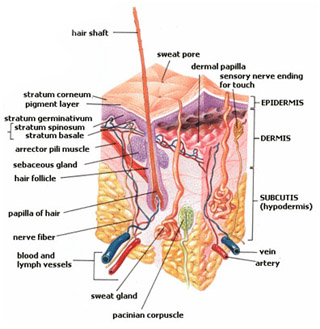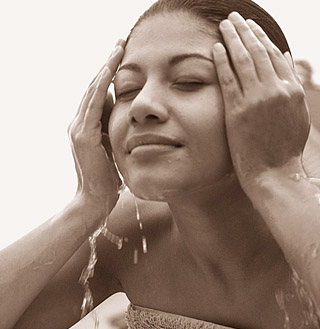Introducing...your skin
Your skin is actually an organ (the body's largest, in fact) and it is made up of multiple layers of epithelial tissues that guard the underlying muscles and other organs. Skin is your body's main interface with its surroundings, and its first defense against pathogens. Its other main functions are insulation and temperature regulation, sensation and vitamin synthesis. In medicine, the branch concerned with the skin is Dermatology.
In addition to its protective physiological functions, skin plays a large role in aesthetics and communication; others see our skin and can assess our mood, physical state and attractiveness. Even the most minor skin conditions can affect us deeply because our skin is one of the first things people see. The term "beauty is only skin deep" may be true, but it is also true that skin problems can run much deeper than our skin. Self-esteem can suffer and therefore our social interactions suffer, too. Our skin does not make us who we are, but it does contain who we are. When that container is out of sorts, our inner selves suffer as well.
This site will examine some of the more common skin problems and identify common causes and treatments. Because this site is for general information purposes only, it is important that you discuss your particular skin problem with a qualified dermatologist or physician before implementing any treatment measures.
Skin: A closer look
Skin is composed of three primary layers: the epidermis, which provides waterproofing and serves as a barrier to infection; the dermis, which serves as a location for the appendages of skin; and the hypodermis, which is called the basement membrane. The skin supports its own ecosystems of microorganisms, including yeasts and bacteria, which cannot be removed by any amount of cleaning. In general these organisms keep one another in check and are part of a healthy skin. When the balance is disturbed, e.g., by antibiotics which kill bacteria, there may be an overgrowth and infection by yeasts. The average square inch of skin holds 650 sweat glands, 20 blood vessels, 60,000 melanocytes, and more than a thousand nerve endings.
The skin is subject to constant attack from without, and so can be afflicted by numerous ailments, some preventable. This site will examine some of the more common skin problems and identify ways of clearing them up. A proper skin-care regime is essential for everyone, however, so it is worth noting some general tips that will give you an extra edge of prevention over potential skin troubles.
skincare tips
Generally speaking, do try to:
- Wash your face twice a day using mild soap and water but do not rub vigorously
- Eat a balanced diet and exercise regularly
- Keep hydrated by drinking plenty of water
- Get the amount of sleep your body needs
- Opt for skin products, including lotions and makeup, that are water-based and oil-free
- Keep oil-containing hair products such as hair spray and styling gels away from your face
- Remove sport helmets and sweaty head bands as soon as your activity is finished and wash them often
- Protect your skin from ultraviolet light: use a water-based, oil-free sunscreen with an SPF of 30 or higher that offers both UVA and UVB protection
- Resist the temptation to squeeze, pinch or pick at any pimples. It will just push the infection further into your skin, causing more swelling and redness and raising the risk of permanent scarring.


